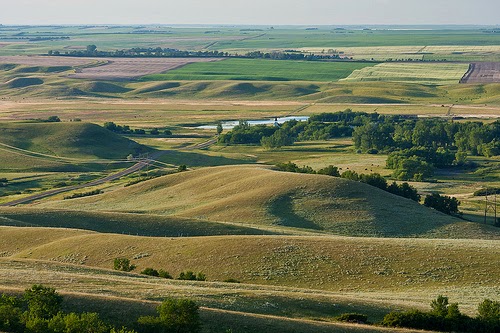My father sits in his accustomed chair at
the head of the kithen table in the house where I grew up. As usual, his chair at the end of the
table is at right angles, facing
the kitchen cupboards. His right
elbow is on the table, and his hand supports his forehead. He weeps. This man who never cries covers his eyes with his hand.
This is his last day in this house. He and my mother have lived here for
more than fifty years. Although he
is ninety-one years old, he is surprised that this day has arrived. He never thought he would have to leave
the community he has known since 1919.
He always expected to die here; it would have been so simple, and so
much easier.
It was to be neither simple nor easy,
however. He would have to reinvent
himself yet again, in a different place, away from the land he loves. He’s already done it once, almost
thirty years before, the fault of a back unable to endure farming any longer
after decades of torture bouncing on a metal tractor seat. That time, he sold the land to good
stewards, and remained in the house.
Precedent does not, however, make this experience easier. He is a product of this place.
This land has carved his body. The bales he has heaved, the rocks and
boulders he has picked from the fields, the horses and plows he has
managed, the tools he has wielded
and the motors he has lifted, all have chiseled a hard, muscled body. Even at ninety-one, his biceps bulge
and his abs are taut.
The land has etched his soul. He respects the acres that sustained
his family, and he respects the forces of nature on whose whims his security
depended.
The small community in a picturesque valley
forms his character. People seek
him out to work his mechanical wizardry on unco-operative machines. He is happy to apply his knowledge and
his gift to the conundrum of the day.
Seldom is he remunerated.
His generosity extends to supporting both community events and
worthwhile national and global projects.
Almost three years after his death, we are still receiving mail
addressed to him from a plethora of organizations he supported.
He is the incarnation of Joseph Boyden’s
insight in The Orenda : “We
are this place. This place is us.”
Saskatchewan is my place, too. I am comfortable here, in the wide-open
spaces on the implacable land with the seductive sky, in the small communities
where the engagement of every single resident matters, and where there’s the space
and the clean air to breathe.
Winter and I have forged an uneasy truce; I invest in warm, impermeable outerwear,
and winter does its thing.
I am at home in this environment, and with
these people. Partnered with a
forbidding landscape that has moulded their character, Saskatchewanians give of
their essence, not just of their surplus, to raise five million dollars
annually for Telemiracle; they support their neighbours in crisis and step up
in a pinch. In this land of good
and generous people, cynicism hides in shame and hope struts its stuff. Here, in a province numbering half the
population of Montreal and one-fifth the population of Toronto, my abilities
and gifts, whatever they might be, make a difference. If I choose not
to get involved, that is one less hand on the plough, one less voice in the
chorus.
When we are in our place, creation,
community, culture, and connection, a curious chemistry of c’s, coalesce in comfort
and a sense of accomplishment.
Sometimes, though, circumstance intervenes. Age, a health event, a job change, a natural disaster, a
political shift, any of those factors might cause us to leave our place of
comfort and accomplishment, or the place to leave us. No matter, we become refugees in a strange land. The trauma of that symbolic exile to
Babylon was too much for my father’s stoicism. What happens to us when we are faced with exile, and what
might we do about it?
Now there’s a question for reflection in the
coming posts.

No comments:
Post a Comment